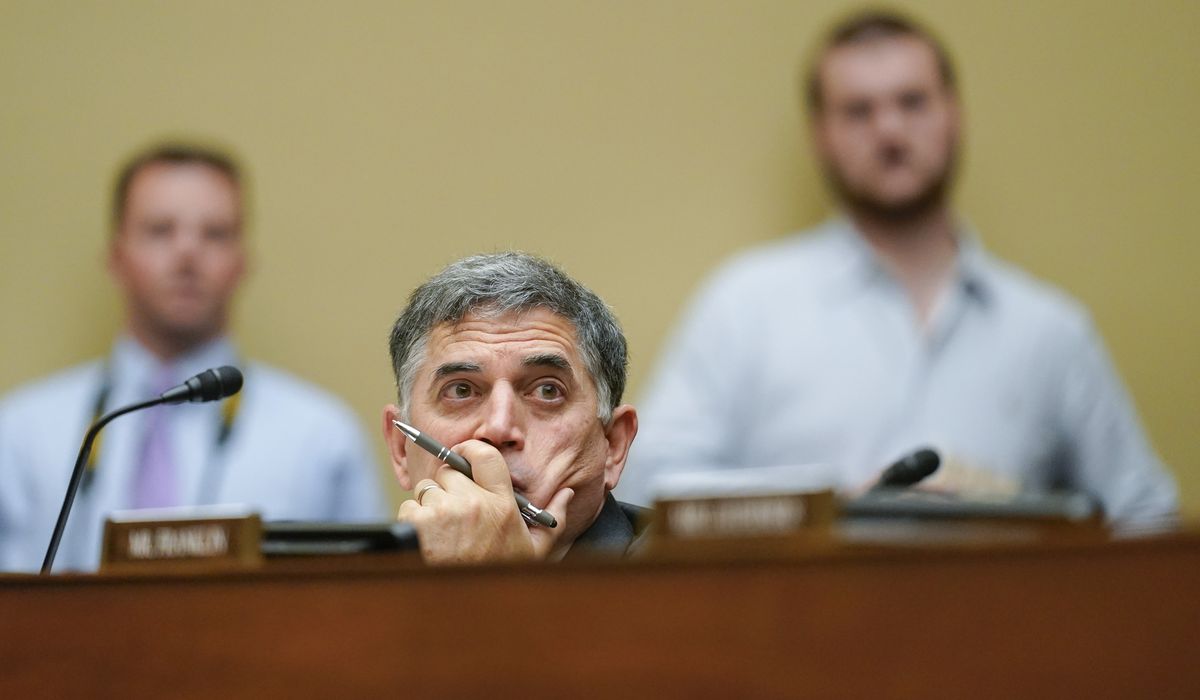Federal firearms dealers are getting their licenses revoked or not renewed by the Bureau of Alcohol Tobacco and Firearms at a much greater rate since President Biden first came to office, a GOP lawmaker said Wednesday.
“Federal Firearms Licensees are being denied renewals or their licenses are being taken away at a rate of about 500% greater since Biden was in office [than in] previous years,” said Rep. Andrew Clyde, Georgia Republican, during a Second Amendment Caucus press conference Wednesday.
“So it is definitely obvious that the Biden administration is targeting Federal Firearms Licensees because they are the link between manufacturers and people being able to access their Second Amendment rights,” he said.
Mr. Clyde, a federal firearms licensee who owns a store in his Athens district called “Clyde Armory,” said that “the motto of my company is we enable individual participation in the preservation of liberty” by giving people access to guns.
“They enable individual participation in the preservation of liberty, because that’s the only way a person, other than making one themselves, can get a firearm in his hands through a manufacturer is through a Federal Firearms Licensee,” he said.
“So if you cut out the Federal Firearms Licensees, then you have denied the American citizens their right to keep in bear arms through not being able to buy a gun. So it’s a problem,” Mr. Clyde argued.
According to Alan Gottlieb at the Second Amendment Foundation, his organization gets many calls from FFL’s every week telling his group the same story.
“Not so much just a revocation [of an FFl license], but also a fine and just being harassed. There’s a lot more of that going on under the Biden restriction than ever before,” Mr. Gottlieb said. “The last time anybody really did anything like that was under Bill Clinton. Bill Clinton figured less guns would be sold if there were less FFL dealers to start with, and so he went out to shrink the number of FFL’s.”
The National Rifle Association-Institute for Legislative Affairs says that Mr. Biden’s administration is running “Clinton playbook again – operating a ‘zero tolerance’ policy that is shuttering FFLs over trivial violations. This sort of schizophrenic policy-making could give the impression that this ‘strategy’ has been motivated by anti-gun politics rather than concerns about violent crime.”
In December 1992, the Violence Policy Center published a report titled “More Gun Dealers Than Gas Stations” decrying what the authors called the “bloated, unmanageable universe of illegitimate FFL holders.”
The Center targeted FFLs they called “kitchen-table” gun dealers.
Less than a year later, Mr. Clinton went after these small business owners, who work from their homes to fill orders.
On August 11, 1993, Mr. Clinton issued a memorandum telling the Treasury secretary to take “whatever steps are necessary” to reduce the number of gun dealers via the licensing process.
In his memo he said, “30 percent of licensees engage in a limited level of business, typically out of private residences.” The ATF, at Mr. Clinton’s directive, established regulatory restrictions that created a minimum threshold of business activity for FFL eligibility.
Mr. Gottlieb said that this crackdown had a perverse outcome.
“Then of course, it really backfires on the other side, because then there are less people to do background checks when more people can apply from private sales,” he said. “So it actually backfired on what the anti-gun left was trying to do.”
A spokesman from the ATF told The Washington Times, that the agency “can only revoke a federal firearms license for willful violations of the Gun Control Act.”
According to the bureau’s website, the ATF will issue a notice of revocation whenever it determines an FFL has willfully engaged in: transferring a firearm to a prohibited person; failing to conduct a required background check; falsifying records, such as a firearms transaction form; failing to respond to a trace request; refusing to permit ATF to conduct an inspection; failure to account for firearms; failure to verify and document buyer eligibility; failure to maintain records needed for successful firearms tracing; and failure to report multiple sales of handguns.
“As noted, willful violations are not common. When an ATF inspection reveals that regulatory violations are the result of inadvertence or administrative mistakes, and are not recurring or threatening to public safety,” the website says. “ATF will work to assist the licensee in taking corrective actions to ensure those violations are not repeated and the licensee achieves full compliance.”

